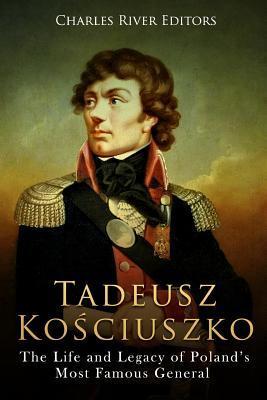Tadeusz Kosciuszko: The Life and Legacy of Poland's Most Famous General

Tadeusz Kosciuszko: The Life and Legacy of Poland's Most Famous General
*Includes contemporary accounts
*Includes online resources and a bibliography for further reading
Many Americans labor under the misconception that the nation's colonial and national heritage was almost wholly accomplished by an English migration, and the notion of early American diversity ends at an acknowledgment of the slave trade conducted between Southern buyers, Northern shippers, the African continent and the Caribbean region. However, early America witnessed the development of New York by the Dutch, the southernmost regions by Spain, and what would become eastern Canada by the French after lengthy battles with Britain. In fact, the Seven Years' War during the 1750s was fought on a nearly global scale between several European belligerents.
As a result, when the Revolution began, the Continental Army sported numerous volunteers from Ireland, Scotland, virtually every European nation between France and Russia, and men from the northern and southern borders of the European continent. There are good reasons America doesn't possess a constitutionally-confirmed national language, despite an English-speaking majority; among the early proposals for such a common language, German and French served as contenders, with the latter going on to become Western Europe's official diplomatic language. Likewise, those who accomplished the legislative, diplomatic, and military miracles that helped 13 separate colonies hold off the greatest power in the world represented a multi-national heritage.
The prospects for a rustic, untrained revolution across the Atlantic carried powerful ramifications for politics, economics, and cultural identity of the individual. Autocrats of the 18th century feared an emerging model from the British-American war that might be refashioned by dissidents within their own colonies. Among those living the consequences of defeat and exile, the soldier class of Europe paid particularly close attention. Some were rapt by the growing ideology of the Enlightenment movement as it pertained to their own cultures while others grew weary of inertia imposed by an inability to practice their craft.
For the gifted Tadeusz Kosciuszko, both were likely true. However, Poland's famous soldier, artist, engineer, and statesman possessed a uniquely expanded vision that perceived the American conflict as the test of a new universal paradigm. A philosophical revolution in itself, the vision held by Locke and Jeffers
PRP: 79.36 Lei
Acesta este Prețul Recomandat de Producător. Prețul de vânzare al produsului este afișat mai jos.
63.49Lei
63.49Lei
79.36 LeiLivrare in 2-4 saptamani
Descrierea produsului
*Includes contemporary accounts
*Includes online resources and a bibliography for further reading
Many Americans labor under the misconception that the nation's colonial and national heritage was almost wholly accomplished by an English migration, and the notion of early American diversity ends at an acknowledgment of the slave trade conducted between Southern buyers, Northern shippers, the African continent and the Caribbean region. However, early America witnessed the development of New York by the Dutch, the southernmost regions by Spain, and what would become eastern Canada by the French after lengthy battles with Britain. In fact, the Seven Years' War during the 1750s was fought on a nearly global scale between several European belligerents.
As a result, when the Revolution began, the Continental Army sported numerous volunteers from Ireland, Scotland, virtually every European nation between France and Russia, and men from the northern and southern borders of the European continent. There are good reasons America doesn't possess a constitutionally-confirmed national language, despite an English-speaking majority; among the early proposals for such a common language, German and French served as contenders, with the latter going on to become Western Europe's official diplomatic language. Likewise, those who accomplished the legislative, diplomatic, and military miracles that helped 13 separate colonies hold off the greatest power in the world represented a multi-national heritage.
The prospects for a rustic, untrained revolution across the Atlantic carried powerful ramifications for politics, economics, and cultural identity of the individual. Autocrats of the 18th century feared an emerging model from the British-American war that might be refashioned by dissidents within their own colonies. Among those living the consequences of defeat and exile, the soldier class of Europe paid particularly close attention. Some were rapt by the growing ideology of the Enlightenment movement as it pertained to their own cultures while others grew weary of inertia imposed by an inability to practice their craft.
For the gifted Tadeusz Kosciuszko, both were likely true. However, Poland's famous soldier, artist, engineer, and statesman possessed a uniquely expanded vision that perceived the American conflict as the test of a new universal paradigm. A philosophical revolution in itself, the vision held by Locke and Jeffers
Detaliile produsului










